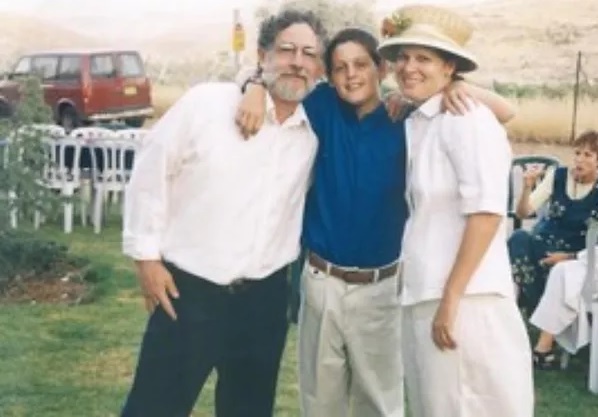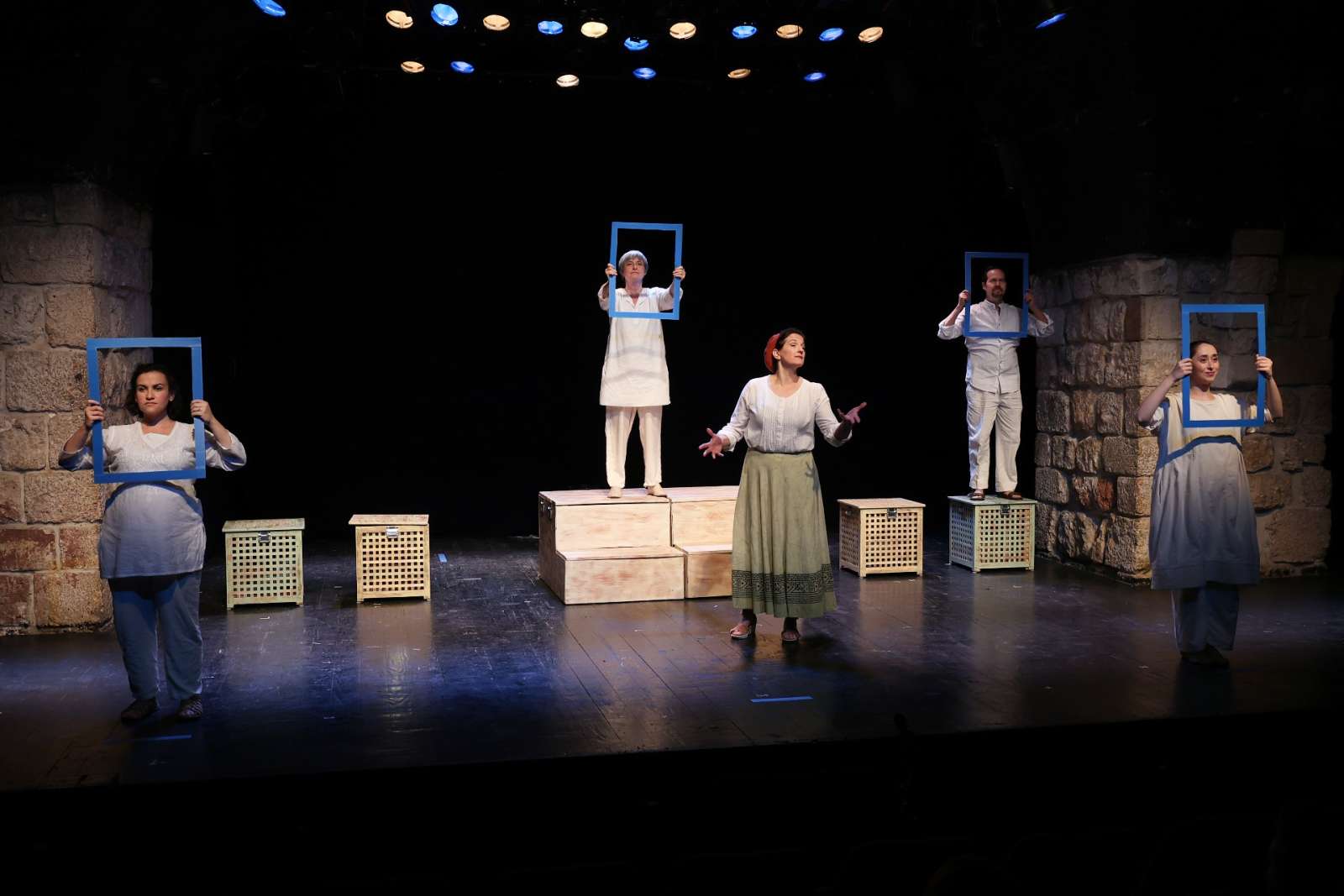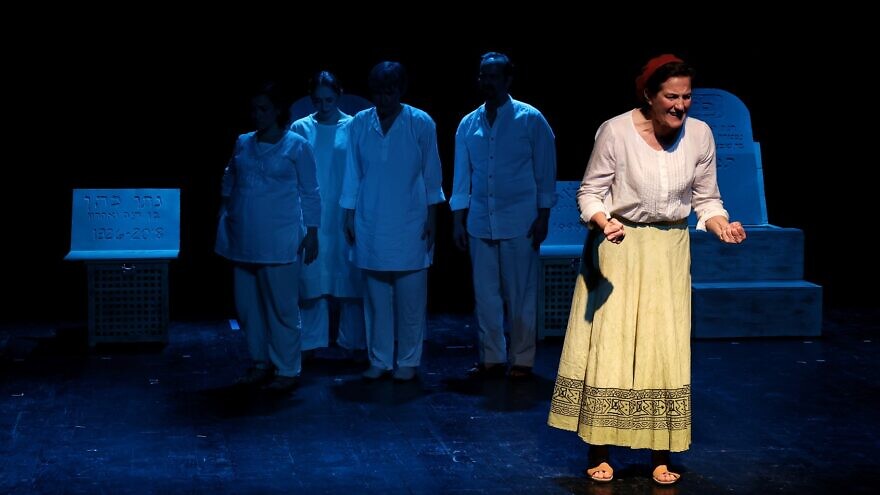“There is nothing as whole as a broken heart.” — Rabbi Menachem Mendel of Kotsk
Some types of pain never end. Sure, the sharp stab in the heart fades as life in all its complexity roars up and grabs your attention. But the pain? It’s a hole in your heart that never fully heals.
The play, currently in theaters around Israel, is based on Mandell’s book of the same name reflecting on the aftermath of the day when the bodies of her 13-year-old son Koby and his 14-year-old friend Yosef Ishran were found beaten and battered in a cave near their homes in the Gush Etzion community of Tekoa.
International fame, a speaking tour and a best-selling book were certainly not in Mandell’s life-plan before that terrible moment. Israel had already been the family home for five years, ever since she and her husband, Seth, along with their four kids, had left suburban Silver Spring, Md.
“I’m basically a private person, and I needed that time just to be, with only my family and close friends,” he said recently over a cup of coffee in Jerusalem’s Mamilla Mall.
As that period of mourning drew to a close and their son’s first yahrzeit approached, slowly the writer in Sherri began to record that pain-soaked year in an attempt to in some small way understand it. “I began to see the writing as a sort of narrative therapy,” she says. The result of that internal excavation, The Blessing of a Broken Heart, was published in 2003.
“There’s so much I still don’t understand about mourning and grief,” says Mandell, now 66. “But I knew even then that it’s important to bear witness and acknowledge it.”
For her, one major lesson was “letting other people in,” she says, looking back on the woman she was 20 years ago. “My house was a mess and my other kids needed so much, and I was in no position to give them. When friends came in to cook and clean and care for the kids, I realized that all my barriers had come down, and I had no more super-ego left. I had to rely fully on them—they were my team, and I can’t imagine how I could have survived that year without them.”

That year also saw the birth of the Koby Mandell Foundation, the family’s initiative to extend a helping hand to families of terror victims. To date, some 10,000 children who’ve lost family members to terror or other tragedies have found summertime solace at Camp Koby, and thousands of adults have received support through individual therapy, as well as bereaved moms and young-adult support groups.
And for the last decade, the popular “Comedy for Koby” has been raising both fun and funds for the foundation. The next tour will start in June at a number of locations around Israel.
At the same time, ready or not, this mom was thrust into the spotlight speaking to groups as far as Australia, Hong Kong and Mexico City. “I found myself an ambassador for Israel,” she says, until two years ago, when COVID-19 kept her grounded in Israel.
‘It just feels right’
In the 18 years since the book’s publication, more than 20,000 copies have been sold, including Hebrew, Spanish and Italian translations. Among its readers was San Diego playwright and director Todd Salovey, who was having a Rosh Hashanah meal with a friend in 2006 when he spotted the book on her shelf. “The minute I started to read, it just captured me,” he says. “I could hear Sherri’s voice so vividly in my head. And I knew it had to be a play.”

After getting the green light from the Mandells, Salovey began to put the script together, remaining faithful to her words. It debuted at the Lipinsky Family San Diego Jewish Arts Festival in his San Diego Repertory Theater. Over the next couple of years, an East Coast tour and performances in Arizona and Los Angeles followed.
But this month was the first time the play has been performed in Israel. “Having it here, it’s like we’re coming home,” says Mandell. “It just feels right.”
And the play has a new twist. Yael Valier, creative director of Theater and Theology that mounted the production, added a four-person Greek chorus to surround, support and bear witness.
‘Heart-wrenching and inspiring at the same time’
“I knew I was going to say ‘yes’ the moment they asked me,” says Valier who lives not far from the Mandells and was among the thousands lining the streets for the funeral procession back in 2001. But the pandemic had other plans. So it was nearly two years from the time they approached her until the curtain came up on “Blessing” in Jerusalem on March 14.
What makes the play work, says Valier, “is that Sherri’s story is both highly personal and universal—one family’s loss and the trauma of terror, a story that’s heart-wrenching and inspiring at the same time.”
But the director acknowledges that she was somewhat intimidated by the prospect. “Intimidated because in order to honor the beauty, fortitude and spirit of this personal history—entrusted to me by people who courageously put their intimate grief and noble hearts on display—I knew I had better get it right.”
Rebecca Sykes was also determined to get it right. Normally appearing in musicals and comedies, the actress had read the book long before she knew she was going to audition for the lead role. “I wanted the chance to be able to honor their story and create a living memorial to their son,” she says.
“It’s a beautiful thing as an actor to take on such a huge role and infuse my own soul into it,” she says. “I loved playing someone who’s so totally herself—her anger and sense of humor, her capacity to feel things so deeply and her great wisdom.”
And the quartet of witnesses who surrounded her? “I can’t imagine doing this play without them,” adds Sykes. “I felt held by them; they were what allowed me to reflect and express, a reminder that we are not alone even in our greatest pain.”
Helping bereaved mothers deal with that pain is something psychodrama therapist Tzippi Cedar has been doing for the Foundation for more than a dozen years. She says it works best in a group setting “since nobody can really understand except another woman who’s lost a child.” Still, adds Cedar, who calls psychodrama “the theater of truth,” the play itself is therapeutic for those who have suffered such tragedy, as well as the audience.
“This play doesn’t take you to an easy place,” she says. “But as it weaves in the past, present and future, it leads you all the way into Sherri’s soul, inviting you to meet her in this intimate place and truly understand the choices she makes.”
Whereas one might expect the play to be depressing, “it’s surprisingly uplifting and not at all awkward because of how the production is done and the energy it creates in the theater—something no movie can do.”
What’s it been like for Mandell to have her intimate experience now seen by audiences on both sides of the Atlantic? “It’s hard,” she says. “But God takes and He also gives, and God has a plan for all of us. We just don’t know what that plan is.”
During that long and tortured first year, there was one night when Mandell walked outside her home and said, “God, show me that he’s OK, I need to know that he’s OK.” Suddenly, a shooting star pierced the night sky.
And then there was her dream where Koby asks her to drive him to school for a test. Once there, when the secretary directs him to the testing room, he smiles and walks away. “I can’t see him; he’s in the other room taking the test,” his mom recalls. “But I know he will pass. And that I will also pass because we’re taking our tests together.”
Koby’s dad also believes his son’s spirit is still active in the world. “It’s clear that Koby’s soul is strong,” says Rabbi Mandell. “But when you lose a child like this, it’s important to give meaning to what happened so his loss isn’t for nothing. When something good comes from tragedy, which we’ve been trying to do through the foundation—to change the world for the better—it’s a living memorial. And I believe,” he adds, “that every bit of good done in his name raises Koby’s neshama, his ‘soul,’ even higher.”
At Koby’s first yahrzeit, 500 people walked with the Mandells to the scene of the killings, the first time they’d entered it since the murders. “The cave was filled with candles,” says his mom. “And it felt somehow holy.”
“The book, the play, Sherri herself come to teach us that rather than deny our loss, we can use it to create a deeper understanding of the world and more compassion for others,” says Salovey. “That’s the blessing of her broken heart and the blessing of this play.”
‘It doesn’t mean I have to like it’
Yet the fact that Koby and Yosef’s killers have never been found feels “complicated” to this mom. “In a way, it’s a relief, because I know people whose kids’ killers were found but let out quickly—one is now a talk-show host—plus to go through a trial, I’m not sure I could have handled it. But,” she quickly adds, “hating is not my job. My job is to find, and then share, meaning. It’s the Torah that teaches us that when the baby bird is taken, the mother’s cry of despair awakens God’s compassion for the entire world.”
“God will punish them in the way God does,” adds Rabbi Mandell. “But as a great rabbi once said, ‘I believe it all comes from God, though it doesn’t mean I have to like it.’ What it does mean is that I have to fight evil with every ounce of my strength.”
One way to accomplish this, his wife has discovered, is to embrace life with all its wonder, its sorrow and its joy (including becoming a grandmother), which is why the title of her second book is The Road to Resilience.
“She shows us what it means to become a better, more empathic person who’s able to experience a deeper kind of joy,” adds Valier. “I hope my audiences leave the theater as awed and inspired by the strength of Sherri Mandell’s response as I am.”
Yet Mandell still holds another dream for the play: to see it performed in Hebrew. “After all, it’s the Israelis’ story, whether they’ve lost children to terror or to war. And maybe, since 20 years have passed since the intifada, now they’re able to see it.”
A film of the Israeli production will be shown online through the Lipinsky Family San Diego Jewish Arts Festival from May 23 to May 30 at: www.sdrep.org/jfest.
To learn more about the Koby Mandell Foundation, visit: kobymandell.org.
To learn more about the Israeli production, how to bring it to your community and to see the trailer, visit: theaterandtheology.org.


























